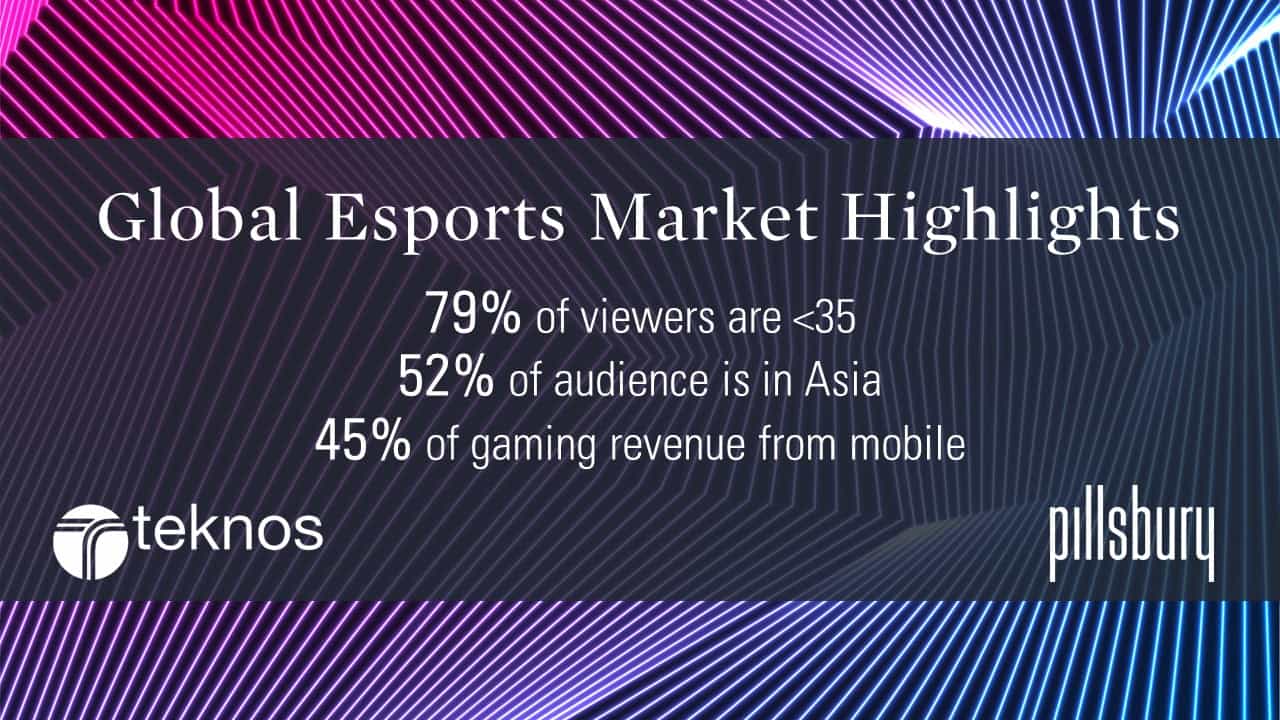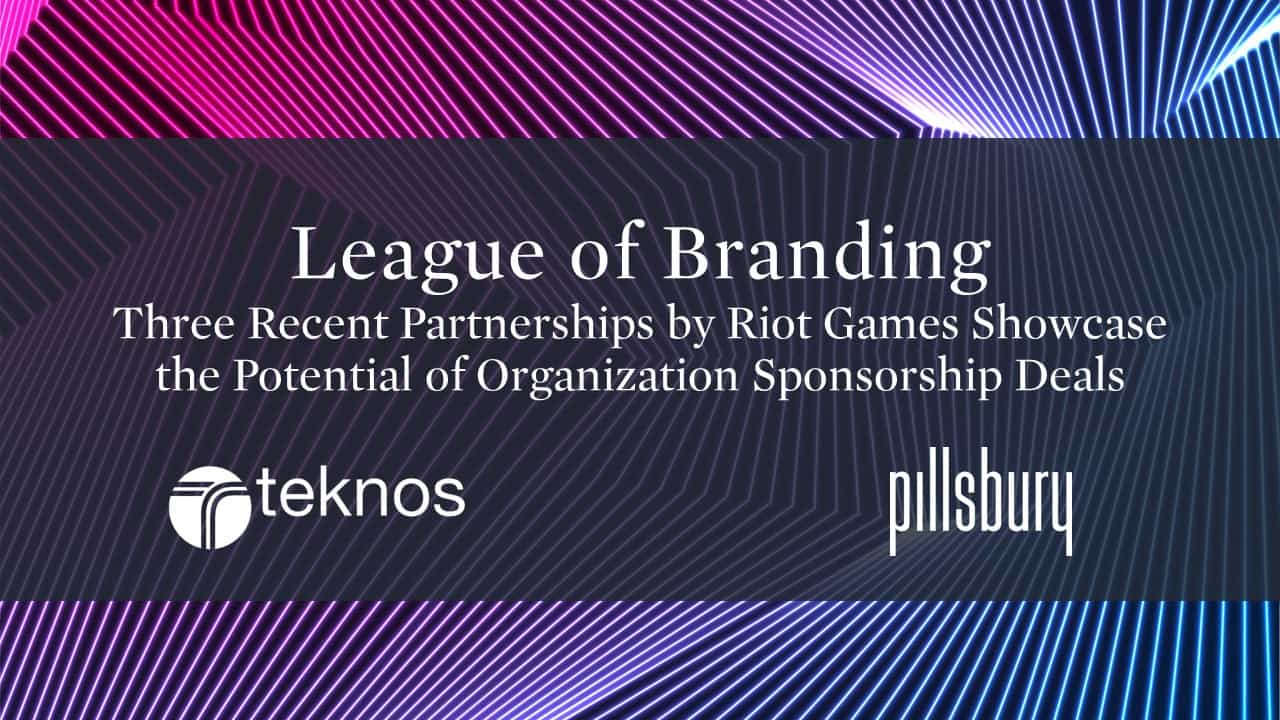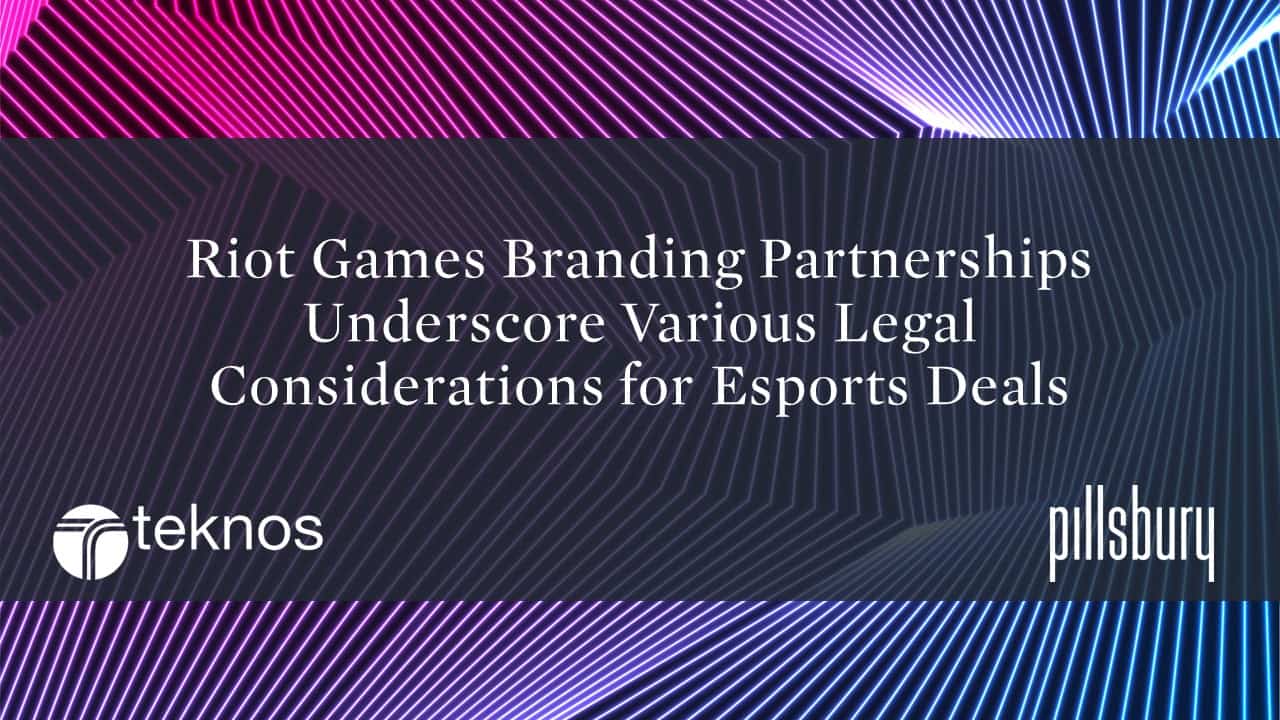Three Recent Partnerships by Riot Games Showcase the Potential of Organization Sponsorship Deals
By James Chang, Sean Gilbert, and Neil Thakur
Last month in Paris, G2 Esports and FunPlus Phoenix competed in front of thousands of fans for the title of world champion, with millions more tuning in to live streams from around the globe.
These teams did not compete on a soccer pitch, a basketball court, or a baseball diamond. Instead, they met on stage at Paris’ AccorHotels Arena, a venue more commonly associated with concerts than competitive sporting events. This event was no “ordinary” world championship; the teams in question participated in one of esports’ preeminent events, the League of Legends World Championship. Despite the title’s humble beginnings, Riot Games’ multiplayer online battle arena (MOBA) offering has grown to levels of popularity historically associated with marquee conventional sports, and the World Championship is League’s crowning achievement.
The event has grown significantly from its first occurrence in a conference room in 2011. Over the years, it has taken place at arenas and stadiums such as the Staples Center in Los Angeles, Madison Square Garden in New York, and the National Stadium in Beijing. While esports is still in its infancy—League of Legends has only existed for 10 years—the demographics of an esports audience are incredibly compelling for both endemic and non-endemic partnerships.
Thanks in part to the proliferation of YouTube, Twitch and other streaming services, esports commands a truly global audience. Furthermore, esports is particularly appealing to a younger—and profitable—demographic, with a 2018 report from Goldman Sachs estimating that 79% of esports viewers are under the age of 35. In addition, according to Newzoo’s 2018 Global Esports Market report, it is estimated that as much as 52% of the global esports audience stems from Asia, a geographic region experiencing robust economic growth and a drastic increase in the incomes of average citizens. As such, it’s no surprise that brands from across the globe are looking to establish partnerships with flagship gaming titles in an effort to expand their presence to new audiences. In the months leading up to the League of Legends World Championship, Riot Games announced a number of partnerships with globally renowned brands—both endemic and non-endemic in nature.

The Unlikely Sponsor: Louis Vuitton
Beginning in September, Riot Games announced a surprising partnership with luxury goods provider Louis Vuitton, which will design a bespoke travel trunk for the Summoner’s Cup (awarded to the winner of the League of Legends World Championship). Though Louis Vuitton had previously produced similar cases for FIFA’s World Cup trophy and the America’s Cup, its foray into the world of esports undoubtedly surprised fans of both League of Legends and Louis Vuitton, yet, given the demographics of esports viewership, it’s not difficult to understand the rationale behind the partnership.
From Riot’s perspective, it is procuring a long-term partnership with a well-known luxury goods brand associated with marquee conventional sports. Such an alignment helps further legitimatize esports as a competitive endeavor even as it helps reframe what one thinks of as the “gaming lifestyle.”
From Louis Vuitton’s perspective, a partnership with Riot Games serves as an opportunity to differentiate itself from other luxury goods brands to an increasingly affluent, global audience that may otherwise never have so much as contemplated purchasing Louis Vuitton products.
Louis Vuitton and Riot Games’ partnership extends far beyond a bespoke case for one of esports most coveted trophies. The partnership will also see Louis Vuitton design in-game cosmetic items for League of Legends that can be purchased via microtransactions. This agreement is the first time that Riot Games is allowing a third-party, commercial organization to design in-game skins and cosmetic items for League of Legends champions.
Given that League of Legends generates the majority of its revenue via in-game microtransactions, this represents a significant extension of good faith on the part of Riot Games, with a very real potential impact on the company’s bottom line. Existing champions skins in League of Legends range from a few dollars to as much as almost twenty dollars, and while details on the exact nature of Louis Vuitton’s offerings have been slim thus far, it’s not hard to imagine that the designs will be priced toward the top end of the range.
Furthermore, the design influence will not be flowing only one way. Louis Vuitton is reported to be participating in a clothing release inspired by two characters from League of Legends, enabling them to establish a compelling crossover narrative across two historically disparate markets.
“A long-term partnership with a well-known luxury goods brand associated with marquee conventional sports helps further legitimatize esports as a competitive endeavor.”
Analysis: Not the Run-of-the-Mill License Agreement
The creation of products that contain inspiration drawn from others—both in a game and in the real world—create interesting issues for the companies in terms of their intellectual property (IP). While the exact details behind the deal are not public, for any company looking to form a collaboration such as this, one of the most important aspects will be creating individual licenses, or a cross license between the two companies, so that they do not infringe on each other’s IP.
For example, for Riot to sell Louis Vuitton-branded skins to its users, it will have to obtain permission to do so. As with any video game developer that sells virtual items, Riot is not only in the position of being the seller of the items, but also its custodian since the items only “exist” to the extent they are stored on Riot’s servers. Louis Vuitton is in a similar situation in that it would have had to obtain a license from Riot to create real-world clothing based on characters in League of Legends. Fortunately for Louis Vuitton and unlike Riot, once Louis Vuitton sells its products to a customer, they no longer need to be a custodian.
The fact that Riot will remain the custodian of the items for as long as the game exists creates an interesting need for Riot that is not seen in your run-of-the-mill license agreement. At some point, if the collaboration between Riot and Louis Vuitton ends but League of Legends continues, Riot will presumably continue to require permission to host the virtual items and display the designs in its game. As such, Riot would have presumably had to have negotiated a requirement that it be able to continue to display the designs even after the cross collaboration ends.
On the other hand, as we have seen in many cases, sometimes partnerships do not end amicably, and the involved parties need to permanently separate from one another. While fans of each brand undoubtedly wish the best for both Riot and Louis Vuitton, the designer may have elected to insert a special termination clause into its license where termination under certain circumstances would require Riot to stop showing its designs even to users who had purchased the skins. This is an especially important consideration for an organization that derives so much of its value from brand equity, as Louis Vuitton does.
Upwardly Mobile: OPPO
Not content to rest on its laurels, one week after the Louis Vuitton announcement, Riot Games unveiled a second, multiyear, global partnership—this time with smartphone manufacturer OPPO. Riot Games’ decision to partner with OPPO makes sense when one considers the significant League of Legends fanbase in China (both OPPO and Tencent, Riot’s parent organization, are Chinese corporations), as well as the general esports demographic viewing trends in the region. Per the terms of the deal, OPPO will serve as a tentpole sponsor for three of League of Legends’ primary international competitions: the World Championship, the Mid-Season Invitational and the All-Star Event. For both the World Championship and Mid-Season Invitational, OPPO will be the presenting sponsor of the respective tournament’s most valuable player (MVP) award. Furthermore, OPPO will present behind-the-scenes footage via its “OPPO Cam” and will produce standalone segments on teams participating in the competitions. While Riot Games certainly stands to benefit from the additional, lifestyle-oriented productions, there is substantial upside for OPPO, as well.
According to Counter Point Research, OPPO’s share of the global smartphone market stood at approximately 9% at the end of Q2 2019, roughly unchanged since Q2 2018. By aligning its brand with a global esports title, OPPO stands to benefit from increased brand recognition, which it undoubtedly hopes will lead to increased smartphone shipments. This is particularly true in the West, where it is less well known compared to brands like Apple, Samsung and Huawei.
Additionally, according to Newzoo, approximately 45% of global gaming revenue (approximately $68.5 billion) is associated with mobile devices, with additional growth in the total gaming market expected to be driven by the mobile sector moving forward. While Riot Games had no official mobile titles at the time of its partnership announcement with OPPO, it would go on to announce three separate mobile games at its 10 Year Anniversary Riot Pls presentation in mid-October. All three mobile titles are expected to launch in China first, driven in large part by Tencent’s existing footprint in mobile gaming in the country, but perhaps as a result of OPPO’s involvement, as well. OPPO’s and Riot Games’ partnership represents a great opportunity for Riot Games to further develop rich and engaging narratives surrounding competitive League of Legends, while OPPO stands to benefit from the exposure brought by one of the world’s largest and most recognizable competitive video games.
Analysis: The Data in the Details
OPPO’s deal to produce videos for Riot’s games using its OPPO cam requires its own set of unique considerations. League of Legends has a strong following across the globe, but one market in which it is especially popular is in Europe, where the 2019 World Championship was hosted. A large European fan base means that European residents will likely be present either in audiences or in the teams, and for any entity wishing to publish content containing images of European residents, that means they would have had to consider the European Union’s General Data Protection Regulation (GDPR).
The GDPR is one of the strongest data protection laws in the world, and its scope is very broad. Part of the law means that organizations must be cognizant of how they process the data of European residents, including their images. For a venue like the World Championships, it would be virtually impossible for OPPO or Riot to gain explicit consent from every European resident to show their image on the OPPO cam, but fortunately, there are a number of other lawful bases for which OPPO and Riot can process their images. It is important for any producer of digital media to carefully consider the justifications it will have in place to produce media that will almost certainly contain images of residents of the European Union.
Since Riot produces its tournament games, it likely has releases that require attendees and participants to grant rights to show their images. OPPO and Riot would need to work out how the relationship between the rights granted to Riot could extend to OPPO or whether OPPO would be responsible for clearing its own privacy and data permissions.
It is important for any producer of digital media to carefully consider the justifications [for] media that will almost certainly contain images of residents of the European Union.
A Partnership that Will Give You Wings: Red Bull
Two weeks after its Louis Vuitton announcement, and one week after its OPPO release, Riot Games announced that it had also procured Red Bull as a partner for its global League of Legends events. Long associated with late-night gaming binges, the energy drink producer is well known throughout the world and has an established presence in adventure sports and motor sports alike.
As one of the most recognizable names in sports, Red Bull’s proliferation into esports involves many games in addition to League of Legends. Red Bull also works individually with gamers and content creators that play many different games, as well as with esports teams. As a lifestyle brand, Red Bull benefits by appealing to a diverse demographic. This coupled with the company’s existing relationships with a number of League of Legends professional teams (e.g., Cloud 9 and G2 Esports), make a long-term, global partnership between the two organizations seem inevitable—especially given Red Bull’s existing involvement with League of Legends’ Brazilian and European leagues.
“For the first time ever, an amateur League of Legends competitor will have an opportunity to participate in the title’s All-Star event; Red Bull will host a “Player One” competition in which the winner will earn a spot to compete on stage with professionals.”
As part of the partnership, Red Bull will have dedicated, branded player areas at all major global tournaments, and will design League of Legends-themed bottles for spectator purchase and placement on broadcasts. For the first time ever, an amateur League of Legends competitor will have an opportunity to participate in the title’s All-Star event; Red Bull will host a “Player One” competition in which the winner will earn a spot to compete on stage with professionals in the tournament’s signature 1v1 format event. Red Bull will also host the official All-Star afterparty, furthering its commitment to the event and cementing it as one of the most recognizable “non-endemic” brands in all of esports.
Analysis: Restrictions May Not Apply
For Red Bull, a brand that is diversified into many different sports and esports, an important consideration of this partnership will be ensuring that no condition in their branding deal with Riot unnecessarily restricts them from affiliating with other sports and, in particular, other esports. While many partnership deals seek to form exclusive relationships with others, for a brand like Red Bull that has so many different initiatives—we are after all talking about a beverage company that has two different Formula 1 racing teams—such an exclusive relationship would likely not be possible.
A Triple Play Worth Studying
Riot Games’ announcements of global partnerships with Louis Vuitton, OPPO and Red Bull all differ in scale, scope and execution. While these agreements may provide ample inspiration and even a potential template for other companies, leagues, and players seeking to form similar partnerships, they should also serve as a reminder of how carefully constructed such deals will need to be to best serve the interests of all involved.
Legal Lessons
Riot Games + Louis Vuitton:
Branding alliances require various licenses to protect each party’s intellectual property.
Riot Games + OPPO:
Tapping the power of a global, increasingly mobile audience necessitates careful attention to cybersecurity and privacy laws.
Riot Games + Red Bull:
When partnering with an existing branding juggernaut, exclusivity may not be in the cards.
How can we help?
Teknos Associates is uniquely positioned to identify and analyze the current and anticipated trends within the esports and gaming industry. From our significant knowledge of how the esports and gaming industries have developed, to our first-hand experience providing advisory services to organizations at all stages of development and growth, our team is ready to help brands capitalize on the myriad of opportunities available in the esports and gaming industries. Our vast experience includes delivering strategic analyses, offering comprehensive guidance, and providing valuations to teams and organizations in the industry. To learn more, contact Teknos Associates at info@teknosassociates.com .


